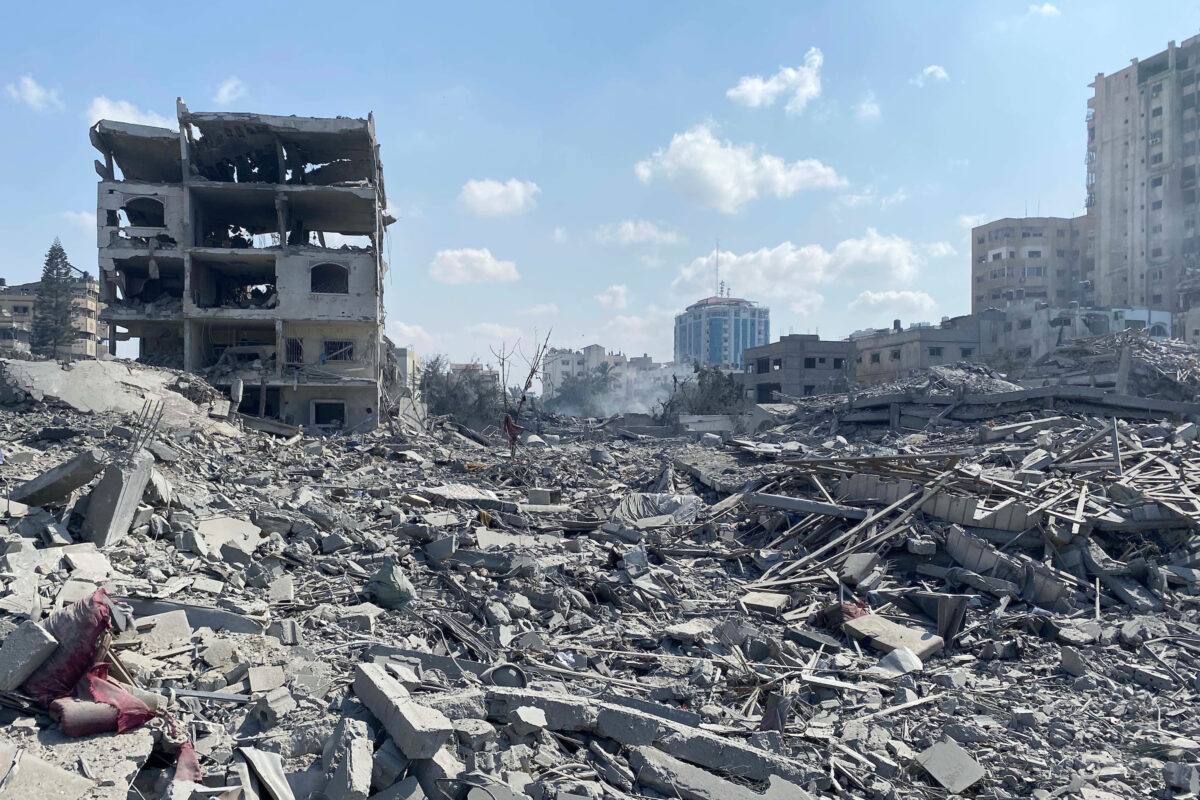They say that in war, ink flows first. There is likely no person in Europe who hasn’t been exposed to Israel’s accusation that Hamas uses civilians as human shields by operating command centres under hospitals, universities, and other civilian infrastructure. Nearly all of this infrastructure has been destroyed in Gaza, but the blame never falls on Israel.
However, the Zionist narrative is collapsing, along with its propaganda promoted by Western media outlets to justify this live-streamed genocide. Western media outlets consistently distort the portrayal of the Israeli assault on Gaza, referring to it as a ‘war’ or ‘conflict’, but never naming it for what it is. The Israeli military (IDF) has killed indiscriminately with the support of Western media, which repeats the false accusations of supposed crimes committed by Hamas—the same crimes the IDF itself commits.
Every accusation is a confession. This sentence captures the narrative distortion of this media war, and how these stories, used over and over again, amplify the lies of the Israeli government, which continues to imagine itself as the ‘only democracy in the Middle East’ with the ‘most moral army in the world’.
There is a saying in Spanish, ‘Lies have short legs.’ The genocide in Gaza has exposed the various lies that Israel has uttered to justify its killings. To expose one of the main lies and justifications, we will focus on an accusation that the Western media has frequently repeated: the use of human shields.
Since the beginning of the attack on Gaza in October 2023, Israel and the Western media have propagated the accusation that Hamas are using civilians as ‘human shields’, attempting to place the responsibility for Palestinian deaths not on the IDF, but on Hamas. The consequences of this have been the unaccountability for whatever the government of Israel does. We should not undermine or ignore the ignominious role of Western media outlets. By echoing that the blame lies with the Palestinian adversary, it contributes to Israel’s state of impunity. No ‘human shield’ has ever prevented Israel from attacking the civilian population; quite the opposite.
This reality is underscored by the IDF’s use of an artificial intelligence programme to exterminate members of Hamas and their families while they are at home. The programme, called ‘Where’s Daddy?’, provides the IDF with information about members of this organisation when they are at home with their families. So when an entire building is bombed, killing dozens or hundreds of civilians, it seems like a necessary evil, entirely justified to put an end to Hamas’ terrorism. Following these bombings, Israel denies responsibility and blames Hamas for the civilian casualties. Unsurprisingly, the same playbook was used in Iran and Lebanon to kill civilians. Meanwhile, these claims are recited over and over again in the Western media, exonerating the perpetrators.
These killings have become commonplace, as Palestinian writer Mohammed El-Kurd observes in his book Perfect Victims and the Politics of Appeal: ‘We die a lot. We die in fleeting headlines, in between breaths. Our death is so quotidian that journalists report it as they´re reporting the weather: Cloudy skies, light showers, and 3,000 Palestinians dead in the past ten days.’ (p. 13)
We will not go into detail about the racist bias behind the dehumanisation of the Palestinian people, which ultimately means that their deaths do not deserve the same attention as others, but focus on the reality that the ultimate goal of the current Israeli government is ethnic cleansing, and that it has not hesitated to commit genocide to achieve that end. It is undoubtedly a convenient method—steering public opinion in a particular direction. Some call it ‘driving the narrative’; Israel calls it ‘hasbara’.
It has now been two years of ongoing extermination of Palestinians in Gaza. Over time it has become increasingly challenging to continue blaming the victims. However, in the West, both the media and politicians try at all costs to avoid holding Israel accountable for its obvious war crimes, with a few moral condemnations here and there, devoid of any effectiveness. This shows that the ruling class in the US and Europe has no genuine interest in stopping this genocide.
Undoubtedly, the story of human shields has been one of the most powerful narratives. Still, the narrative doesn’t hold up, especially in light of the countless deaths caused by the sophisticated Israeli machine, specialised in killing civilians. However, there is an interesting twist when it comes to these false accusations.
The use of human shields seems to be a recurring practice by the IDF itself, according to Israeli media outlet Haaretz in a report published last year. Images of Palestinians tied to tanks and military vehicles as they drove through the West Bank have circulated on social media. Another article in the New York Times (a media outlet that can hardly be accused of any ‘pro-Hamas’ bias) seems to take these practices for granted; the text is unambiguously titled ‘How Israel’s Army Uses Palestinians as Human Shields in Gaza.’ It tells the story of Mohammed Shubeir:
‘After Israeli soldiers found Mohammed Shubeir hiding with his family in early March, they detained him for roughly 10 days before releasing him without charge, he said.
‘During that time, Mr. Shubeir said, the soldiers used him as a human shield.
‘Mr. Shubeir, then 17, said he was forced to walk handcuffed through the empty ruins of his hometown, Khan Younis, in southern Gaza, searching for explosives set by Hamas. To avoid being blown up themselves, the soldiers made him go ahead, Mr. Shubeir said.’
There are several similar cases documented and published in the Israeli press, but (oh surprise!) little was reported by the Western media. An article published in February 2025 exposed the case of an 80-year-old man who, after being used as a human shield, was killed along with his wife by the IDF.
The dissident group Breaking the Silence collects testimonies confessing war crimes committed by Israeli soldiers. In an interview, executive director of the group and former IDF soldier, Nadav Weiman, claims that these practices have become more frequent since 7 October 2023, with several cases already reported. He notes, ‘It is something that the IDF is using more and more and in other areas during this war.’
In the West, despite ample evidence that the IDF uses these practices, which openly violate all kinds of human rights and international law, the version of the Israeli hasbara continues to be amplified by the media. The Western press continues to show more outrage at artists who publicly oppose the genocide than at the genocide itself. (The real scandal is in the words, not in the actions.) In this way, the media consistently demonstrates their clear pro-genocidal bias. The case of a group of BBC journalists accusing the media outlet of promoting an openly anti-Palestinian and pro-Israeli view is only the tip of the iceberg.
The case of the ‘human shields’ has been one of the most effective propaganda tools for protecting Israel from its immense culpability and war crimes carried out with complete impunity. It will be tough to speak of ‘ignorance’ on the part of Western politicians and media regarding these crimes, whose active participation in constructing the frame to justify the unjustifiable reveals their plain complicity.
The visibility of the genocide remains to have no effect on those who could stop the massacres of the Palestinian people. But, despite all the horror, bloodshed and violence, one small hope remains—the Zionist narrative is running out of all its ‘slogans’ to evade responsibility.
It is time for the people of Europe to face up to the symbolic and political burden of their inaction in allowing the media and politics to continue shielding the perpetrators. It is necessary to end the impunity of this regime and unmask its countless financiers, propagandists, collaborators, and bystanders. Because sooner or later the prediction of writer Omar El Akkad will come true: ‘One day, everyone will have always been against this.’




